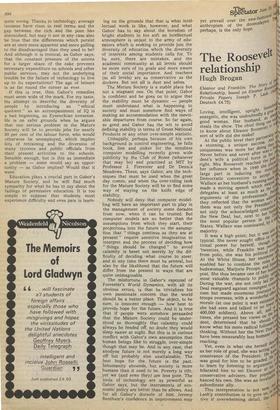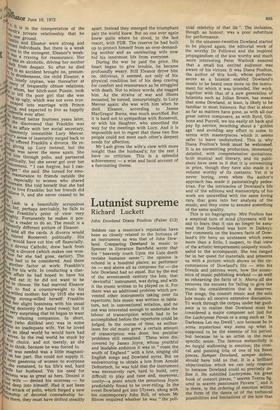The Roosev it
relationship
Hugh Brogan
Eleanor and Franklin: The StorY Relationship, based on Eleanor R°' Private Papers Joseph P. Lash of Deutsch £4.75) I, told' -° s, Loving, intelligent, upright, energetic, she was undoubtedly a graio good woman. Her husband, as oh, steals the show. The chief thing 0/1.5: vi to know about Eleanor Roosevelt 1 sort of wife did she make? rshiP At the public level their par 3.11:n a stunning, a unique success' 111 9 uniqueness was more her doing Never before and never after Washer dent's wife a political force 1t1 eal( right. Mrs Roosevelt reached the Played her influence when in 1940 she 12.ici large part in inducing the te7 Democratic convention to accep'ate. Wallace as her husband's running-11d made a moving speech which delegates at least as much as there arguments of the professionals.de they ,reflected that the virotnan add( they was not only the Presidem.1 not only the acknowledged cons% the New Deal, but, next to her Si the most popular person in the States. Wallace was nominated, to majority. • als° It was a high point; but it Wa" co typical. She never sought office °,,r tional power for herself, thotig"rove 'twenties, while Franklin was r''ra d from polio, she was his political s s At the White House, her enornleti enabled her to combine the rolee.5 budswoman, Marjorie Proops, and„lis Ii post. She thus became one of hel;'-op' most valuable channels to Pub`A'ettie During the war, she not only leu,nn Deal rearguard against resurgellt,':5 t tism but made enormous jourile,";$ troops overseas, with a wonderfUl ,L morale (at one point it was estillie she had seen and talked to no st 400,000 soldiers). Above all arl.,;e times, she pressed her views on 781 It dent, determined that he sh0u5 know what his more radical follovl,de' thinking. Without her the NeW De; d have been measurably less humane )1 reaching. Yet, even in what she herself delo as her role of goad, she was acting ralea' connivance of the President. 14ed; 10 was good for him to be goaded. r" to learn by listening to argumeaths:5111 hilarated him to set Eleanor at h poffilw:boe, conservative advisers. Her anced his own. She was an invallj" subordinate ally. This interpretation is not 0e0,8110 Lash' contribution is to give U'' tive if overwhelming detail,
5
)46sIt. It is in the interpretation of the 14kevelt's private relationship that he Fran8L11,ew ground. le 'an and Eleanor were strong and 'crant individuals. But there is a weak hieLren to the strongest. Eleanor's weak'era craving for reassurance. Her ite Was an alcoholic, driving her mother lefth, from despair. So after he died b,41 an accident brought on, presurnch; drunkenness, the child Eleanor, a it', lonely orphan, was thereafter at oterq of frequently obtuse relations, Whom, her bitch-aunt Pussie, took to tell the poor girl that she was uP ugly, which was not even true. eScaped into marriage with Prince and expected to live as happily shquerella ever after. ere le,_arned better fourteen years later, ein she discovered that Franklin was .! an affair with her social secretary, n'PParently irresistible Lucy Mercer. sense of insecurity surged back to e offered Franklin a divorce. He re`! giviflg up Lucy instead; but the eadge was never the same again. She JUITi. through polio, and partnered °,ntically, but she never got over her t„s40nment. "I can forgive, but I can'rget " she said. She turned for emoib, reassurance to friends outside the bf.: especially to women who shared "erests, She told herself that she had brit° love Franklin: but her friends did oous".eve it, and she never ceasedto be lir , te_ 1-ash is a beautifully scrupulous Isiciu. but, perhaps inevitably, he fails to er Franklin's point of view very lighlY. Fortunately he makes it posf°r a reader to do so. The result is a iree neld all the cards. A divorce would ar Would have cut him off financially. held different picture of Eleanor. rnitied Roosevelt politically. His a devout Catholic, drew back from hing a divorce (which makes one won. far she had gone, earlier). The 'en had to be considered. And there another factor at work: Franklin's for his wife. In conducting a clanaffair he had hoped to have his ,14 k,e,and eat it; he did not want to be hq to choose. He had married Eleanor ;art to find a counterweight to his l.g-Willed mother; but by 1915 she was 'ing strong-willed herself. Franklin " her slight bossiness with his usual ii dexterity (he hated rows); but it 'e5 surprising that he began to want 're relaxing companion. In short, r, or (who disliked sex) was in some "eqs an inadequate wife. Yet he loved d In an ideal world he would have had Wrilies. In the real world he stuck by rst choice, and not merely, as she lkie, to think, because he was forced to. at was needed was a little magnaniOn her part. She could not supply it. InCkst generous of women to everyone the remained, to his life's end, hard ''rds her husband. Yet his need for kerriess was as great as hers. Denied it wife — denied his mistress — he „ed deep into himself. Had it not been el,Te attack of polio, which forged a new ,"onship of devoted comradeship be'n them, they must have drifted steadily apart. Instead they emerged the triumphant pair the world knew. But no one ever again knew quite where he stood, in the last resort, with FDR. The reserve he had built up to protect himself from an over-demanding mother and an unrelenting wife now hid his innermost life from everyone.
During the war he paid the price. His heart began to give trouble, he became profoundly weary. Still Eleanor drove him on, oblivious, it seemed, not only of his physical condition but of his deep craving for comfort and reassurance as he struggled with death. Not to mince words, she nagged him. As the strains of war and illness mounted, he turned, unsurprisingly, to Lucy Mercer again: she was with him when he died. Eleanor, according to James MacGregor Burns, was much mortified. But it is hard not to sympathise with Roosevelt, or with his daughter, who smoothed the way for the meetings with Lucy. And it is impossible not to regret that these two fine people could not meet each other's deepest needs for affection.
Mr Lash gives the wife's view with more insight than the husband's; for the rest I have no criticism. This is a splendid achievement — a wise and lucid account of a fascinating theme.









































 Previous page
Previous page